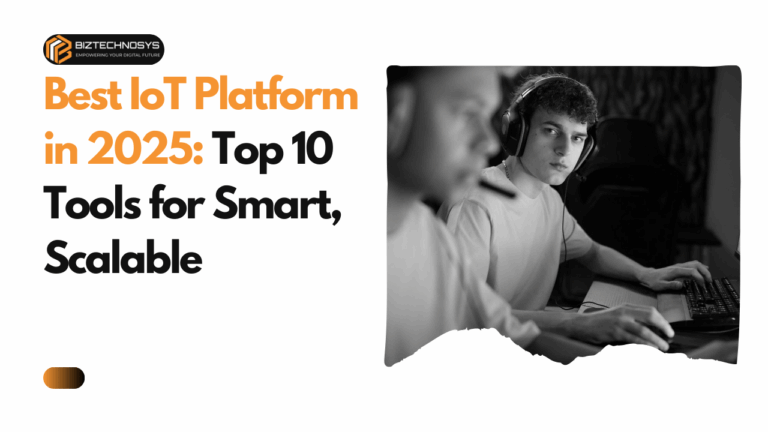
The Internet of Things (IoT) continues to revolutionize industries by connecting physical devices to the digital world. From smart homes to advanced industrial systems, IoT technology enables real-time data collection, device communication, and intelligent automation. As this technology evolves, choosing the best IoT platform becomes crucial for efficient deployment and scalability.
An IoT platform is a suite of services and tools that connect hardware, access networks, and manage data streams. These platforms help developers build applications that can monitor, control, and automate IoT devices. A powerful IoT platform provides connectivity, device management, data analysis, integration with cloud platforms, and security.
There are several types of IoT platforms, each serving unique business needs:
Device Management Platforms – Enable monitoring, firmware updates, and security.
Connectivity Platforms – Manage the data transmission between devices.
Cloud Platforms – Offer scalable storage, analytics, and application development.
Application Enablement Platforms – Provide tools and APIs to create custom IoT applications.
The answer depends on specific project needs, such as scalability, integration capabilities, and cost. However, leading platforms like AWS IoT, Microsoft Azure IoT, and Google Cloud IoT dominate the market with comprehensive solutions.
Continue reading about How Sitecore’s AI Features Can Transform Your Marketing Strategy with this link.
The main categories are:
Connectivity Management: This type handles the seamless transmission of data between IoT devices and the cloud. It includes network protocols, SIM management, and roaming services. Effective connectivity platforms ensure secure, reliable, and scalable communication across multiple network types such as Wi-Fi, LTE, 5G, or LoRaWAN.
Device Management: Device management platforms provide the tools to register, monitor, update, and troubleshoot IoT devices remotely. They enable businesses to maintain device health, roll out firmware updates, and enforce security policies—ensuring the longevity and safety of IoT infrastructure.
Data Management and Analytics: These platforms are designed to collect, process, and analyze the data generated by IoT devices. They transform raw data into actionable insights using real-time dashboards, machine learning models, and predictive analytics—empowering informed decision-making.
Application Enablement: Application enablement platforms offer development frameworks, APIs, and integration tools to build custom IoT applications. These platforms bridge the gap between the backend systems and user interfaces, allowing developers to create scalable, feature-rich IoT solutions quickly and efficiently.
Amazon Web Services (AWS) is often considered the best cloud platform for IoT due to its robust scalability, vast toolset, and global reach. However, Microsoft Azure and Google Cloud are close competitors offering equally reliable services.
Several open-source IoT platforms are available for developers and startups. ThingsBoard, Kaa, and OpenRemote are popular free options that provide essential features like device connectivity and real-time dashboards.
IoT cloud services enable remote device management, data storage, and analysis. Cloud integration is essential for:
Scalability
Real-time monitoring
Cost efficiency
Seamless integration with third-party applications
These services make it possible to deploy, manage, and optimize large-scale IoT solutions globally.
Continue reading about Benefits of Sitecore Development with this link.
Here’s our list of the top IoT platforms leading the industry in 2025:
AWS IoT Core offers scalable connectivity, device management, and analytics. Its integration with other AWS services makes it the best IoT platform for enterprise use.
Azure IoT provides tools for building secure and scalable IoT applications. Its advanced analytics, AI integration, and Microsoft ecosystem compatibility make it ideal for industrial IoT solutions.
Oracle’s IoT Cloud combines device management, predictive analytics, and business intelligence, catering to manufacturing, logistics, and automotive sectors.
Particle offers edge-to-cloud solutions with integrated hardware, software, and connectivity. It’s ideal for prototyping and commercial deployment in startups.
Voracity offers fast, secure, and scalable data integration for IoT environments. It excels in data masking, data transformation, and analytics.
Developed by PTC, ThingWorx is optimized for industrial IoT (IIoT). It supports application development, analytics, and augmented reality features.
Google’s IoT Core integrates with BigQuery, AI, and ML tools. Its seamless infrastructure and analytics tools make it one of the top IoT platforms for data-centric applications.
Cisco specializes in network-centric IoT solutions, offering secure device connectivity and real-time data transmission for industries like transportation and utilities.
Salesforce integrates IoT data with its CRM capabilities, making it ideal for customer-focused businesses aiming to enhance service personalization.
IBM Watson leverages AI and machine learning to offer advanced analytics and automation. It’s especially useful in industries like healthcare, manufacturing, and automotive.
Continue reading about Drupal for E-commerce with this link.
When selecting an IoT platform, consider:
Scalability: Can it grow with your business?
Integration: Does it support APIs and third-party services?
Security: How well does it handle data privacy and cybersecurity?
Cost: What’s the pricing model?
Support: Is technical support readily available?
Analytics: Does it offer actionable insights?
With countless options available, selecting the best IoT platform in 2025 requires careful consideration of your business goals and technical needs. From AWS and Azure to open-source options, each platform has unique strengths. By aligning platform capabilities with your objectives, you can build efficient, secure, and scalable IoT solutions.
Continue reading about Is Drupal Secure? with this link.

We are your Strategic IT Partner in development of reliable and scalable IT solutions for any OS, browser and device. We bring together deep industry expertise and the latest IT advancements to deliver custom solutions and products that perfectly fit the needs and behavior of your target audience.
Skype :: biztechnosys
AUS :: +61 4684 88455
INDIA :: +918035827097
Email :: info@biztechnosys.com
Copyright © 2012 – 2026 BIZTECHNOSYS. All Rights Reserved.